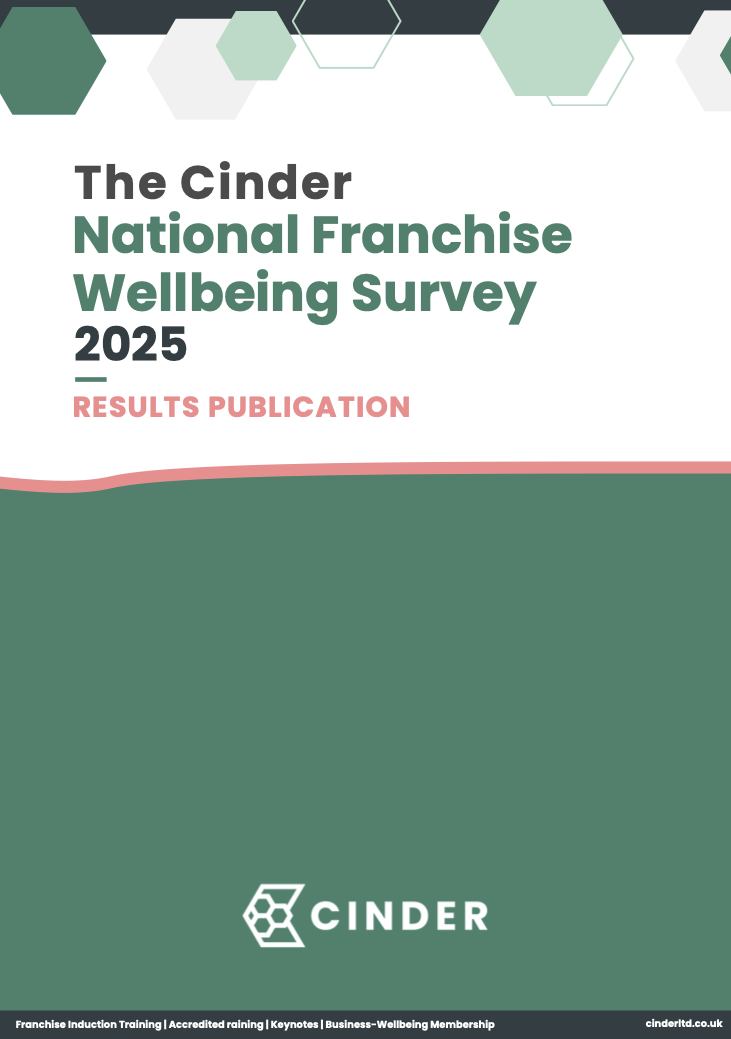Posted:23-June-2025
97% of franchisors say mental health impacts business - and now they're ready to lead the change

A clear message is emerging from the franchise sector: mental health matters – and it’s directly tied to business performance. In a recent nationwide survey, 100% of franchisees and 97% of franchisors said mental health challenges have affected, or could affect, the health of their business. Over 60% of franchisees reported experiencing stress, overwhelm, or low mood. Yet fewer than 1 in 5 franchises have a formal wellbeing policy in place.
But the story isn’t all bleak – many franchisors are beginning to recognise the urgency of the issue and are stepping forward to lead the change. There’s a growing awareness that supporting mental wellbeing isn't just the right thing to do – it’s also key to long-term success, retention, and business resilience.
In February, Jen Chapman-Boffin, founder of Cinder, launched a nationwide survey to spark honest conversations about mental health in franchising and uncover how wellbeing is really being supported across the sector. The goal was simple: to gather real insights, highlight the challenges, and identify where change is already beginning.
Now, as the very first National Franchise Wellbeing Week kicks off on 16th June, in partnership with the British Franchise Association (BFA), Jen is sharing the results – and spotlighting the stats that can encourage franchise brands to lead the way forward for a healthier, more supportive franchise industry. The survey highlights the positive recognition across franchising of how crucial wellbeing is to business success. But alongside this progress comes the reality that only 13.4% of franchisors provide external wellbeing training, and fewer than 20% have a formal wellbeing policy in place. This suggests that while support exists, it isn’t always consistent or embedded.
It’s encouraging to see that 1 in 5 franchisors and franchisees are already having one-to-one conversations about mental health. These honest, personal conversations are a powerful way to break down barriers and build trust, showing that people do want to support each other. While there’s room for more of these conversations to happen, this positive start is a strong foundation for creating a resilient, more connected franchising community where everyone feels heard and supported.
Franchisees, in particular, are feeling the pressure. The franchise model rightly promotes independence and entrepreneurship, but that autonomy can come at the cost of isolation. Ultimately, loneliness is a significant concern, with 75% of respondents experiencing it and 40% feeling lonely at least once a month. This widespread experience underscores the urgent need for more robust mental health and wellbeing support.
Almost half of franchisees believe that franchisors genuinely care about their wellbeing. While franchisors are clearly eager to help, 44% admit that other business priorities sometimes take precedence over wellbeing initiatives. Many recognise that they could, and should, be doing more – showing a strong commitment to moving from awareness to meaningful action.
“It’s encouraging to see how much mental health awareness has grown in franchising. The overwhelming recognition that wellbeing affects business performance is a huge step forward. But awareness alone isn’t enough. The data shows we need to move beyond good intentions to practical, structured support that reaches every franchisor and franchisee. Mental health isn’t a ‘nice to have’ – it’s essential for sustainable success. The franchise industry has the potential to lead the way by prioritising wellbeing and creating a culture where no one has to face these challenges alone,” explained Jen.
The industry’s readiness for change is clear: only 17% of franchisees and 24% of franchisors believe enough is currently being done to support mental health. This shared acknowledgement is a vital first step towards building healthier, more supportive franchise communities. This survey is a call to action – a chance for franchisors and franchisees to come together and build a more open, supportive, and resilient sector.
As Jen continues to champion mental health in franchising, the next focus will be on delivering accessible tools, training and policies that make wellbeing an everyday priority. One of the ways Cinder does this is by creating franchise-specific mental health support packages that are included from day one as part of the franchisee’s induction – alongside start-to-finish training and consultancy to support franchisees throughout their entire journey.
“It’s been amazing to see how open the industry is to change. We’re building a future for franchising that’s rooted in wellbeing, trust and genuine human connection,” concluded Jen.
To see the full results, visit: https://cinderltd.co.uk/cinder-wellbeing-survey-2025/




